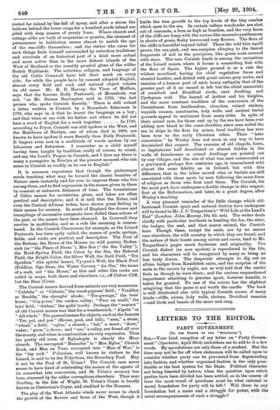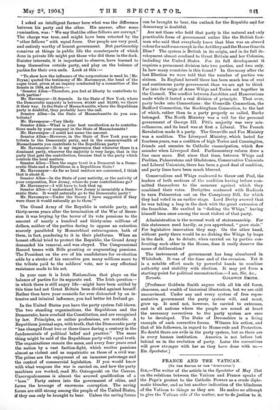LETTERS TO THE EDITOR.
[TO TIM EDITOR OP THE " SPECTATOR"]
Sra,—Your kind reception of my letter on "Party Govern- ment" (Spectator, April 23rd) emboldens me to add to it a few words. My speculations are only those of a student. Rut the time may not be far off when statesmen will be called upon to consider whether party can be prevented from degenerating into faction, and whether organised faction is the only prac- ticable or the best system for the State. Political ehara,cter not being bisected by nature, when the question upon which parties have been divided has been 'settled, as in the coarse of time the most vexed of questions must be, what rational or moral foundation for party will be left ? Will there be any foundation but a name and a struggle for power, with the
usual accompaniments of such a struggle? • I asked an intelligent farmer here what was the difference between his party and the other. His answer, after some rumination, was: "We say that the other fellows are corrupt." The charge was true, and might have been retorted by the "other fellows" with equal force. Our people are very good, and entirely worthy of honest government. , But partisanship connives at things in public life the counterparts of which done in private life might put those who did them in the dock. Sinister interests, it is important to observe, have learned to keep themselves outside party, and play on the balance of parties for their own ends. Look at this :—
" To show how the influence of the corporations is used he [Mr. Bryan] quoted the testimony of Mr. Havemeyer, the head of the sugar trust, given at an inquiry conducted by a committee of the Senate in 1894, as follows :—
`Senator Allen—Therefore, you feel at liberty to contribute to both parties ?
Mr. Havemeyer—It depends. In the State of New York, where the Democratic majority is between 40,000 and 50,000, we throw it their way. In the State of Massachusetts, where the Republican party is doubtful, they probably have the call.
Senator Allen—In the State of Massachusetts do you con- tribute?
Mr. Havemeyer—Very likely.
Senator Allen—What is your best recollection as to contribu- tions made by your company in the State of Massachusetts ? Mr. Havemeyer—I could not name the amount.
Senator Allen—However, in the State of New York you con- tribute to the Democratic party, and in the commonwealth of Massachusetts you contribute to the Republican party ?
Mr. Havemeyer—It is my impression that wherever there is a dominant party, wherever the majority is very large, that is the party that gets the contribution, because that is the party which controls the local matters.
Senator Allen—Then the sugar trust is a Democrat in a Demo- cratic State and a Republican in a Republican State ? Mr. Havemeyer—As far as local matters are concerned, I think that is about it.
Senator Allen—In the State of your nativity, or the nativity of your corporation, New Jersey, where do your contributions go ? Mr. Havemeyer—I will have to look that up.
Senator Allen—I understand New Jersey is invariably a Demo- cratic State. It would naturally go to the Democratic party ?
Mr. Havemeyer—Under the theory I have suggested if they were there it would naturally go to them."
The Grand Army of the Republic is outside party, and thirty-seven years after the termination of the War of Seces- sion it was levying by the terror of its vote pensions to the amount of nearly a hundred and thirty-nine millions of dollars, neither of the parties daring to oppose an extortion scarcely paralleled by Monarchical extravagance, both of them, in fact, pandering to it in their platforms. When an honest official tried to protect the Republic, the Grand Army demanded his removal, and was obeyed. The Congressional Record teems with Bills granting or augmenting pensions. The President on the eve of his candidature for re-election adds by a stroke of his executive pen many millions more to the tribute paid to the soldiers' vote, nor is any effectual resistance made to his act.
In your case it is Irish Nationalism that plays on the balance of parties for its separate' end. The Irish question— in which there is still angry life—might have been settled by this time had not Great Britain been divided against herself. Rather than have your councils for ever distracted by an in- trusive and inimical influence, you had better let Ireland go.
In the United States you have the party system full-blown. The two standing organisations, the Republican and the Democratic, have overlaid the Constitution, and are recognised by law. Principles, or rather professions, are mutable. A Republican journal says, with truth, that the Democratic party "has changed front two or three times during a century in the fupdamentals of political belief and practice." The same thing might he said of the Republican party with equal truth. The organisations remain the same, and every four years rend the nation by a vast faction-fight, which excites passions almost as violent and as unpatriotic as those of a civil war. The prizes are the enjoyment of an immense patronage and the control of commercial legislation. If you would know with what weapons the war is carried on, and how the party machines are worked, read Mr. Ostrogorski on the Caucus. Unscrupulousness is almost the avowed qualification of a
"boss." Party enters into the government of cities, and forms the leverage of enormous corruption. The saving forces are still strong among the people of the United States, if they can only be brought to bear. Unless the saving forces Are not those who hold that party is the natural and only practicable form of government rather like the British foot- man who said that everybody knew that blue was an absurd colour for uniforms except in the Artillery and the Horse Guards Blue P The system is British in its origin, and in its full de- velopment almost confined to Great Britain and her Colonies, including the United States. For its full development it requires a permanent division into two parties, and two only. In how many countries is this found P In Germany after the last Election we were told that the number of parties was sixteen. In England herself there has been much less of real and continuous party government than we are apt to think Far into the reign of Anne Whigs and Tories sat together in the Council. The conflict between Jacobites and Hanoverians made while it lasted a real division of principle. That over, party broke into Connections : the Grenville Connection, the Bedford Connection, the Rockingham Connection, to the last of which, rather than to a party properly so called, Burke belonged. The North Ministry was a veil for the personal government of George IIL Pitt's majority was very mis- cellaneous, and its head was at first a Liberal. The French Revolution made it a party. The Grenville and Fox Ministry was a coalition. The Liverpool Ministry, which lasted for fourteen years, was a coalition of high Tories and Ctumingites, friends and enemies to Catholic emancipation, which flew asunder when Liverpool died. Parliamentary reform drew a line once more. But since that time, between Whigs and Peelites, Palmerstons and Gladstones, Conservative Unionists and Liberal Unionists, there has been a good deal of coalition, and party lines have been much blurred.
Conservatives and Whigs coalesced to throw out Peel, the leaders of both sections of the coalition having before coin- mitted themselves to the measure against which they combined their votes. Derbyites coalesced with Radicals to turn Palmerston out on the Conspiracy Bill, for which they had voted in an earlier stage. Lord Derby avowed that he was taking a leap in the dark with the great extension of the franchise. He exulted in "dishing the Whigs," having himself been once among the most violent of that party.
Administration is the normal work of statesmanship. For this statesmen need hardly, as you apprehend, "grow stale." For legislative innovation they may. On the other hand, without party there would be no dishing the Whigs by leaps in the dark. As to debate, when carried on by parties con- fronting each other in the House, does it really deserve the name of deliberation P
The instrument of government has long slumbered in Whitelock. It was of the time and of the occasion. Yet it is a notable effort made by powerful bands to combine authority and stability with election. It may yet form a starting-point for political reconstruction.—I am, Sir, &c., Toronto. GOLDWIN SMITH.
[Professor Goldwin Smith argues with all his old force, clearness, and wealth of historical illustration, but we are still
unconvinced. Under any and every system of free repre- sentative government the party system will, and must, grow up. It need not, however, be carried to extremes, and in all nations where the people are sound at heart the necessary correctives to the party system are sure to be developed. The Duke of Devonshire is a living example of such corrective forces. Witness his action, and that of his followers, in regard to Home-rule and Protection. No doubt there are evils in the party system, but so there are in every human institution. America is not before but behind us in the evolution of party. Later the correctives will grow stronger with her as they have done with us.— ED. Spectator.]







































 Previous page
Previous page